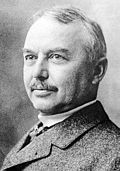| |||||||||||||||||||||||||
| |||||||||||||||||||||||||
 County results McCullough: 30–40% 40–50% 50–60% 60–70% Clement: 50–60% 60–70% | |||||||||||||||||||||||||
| |||||||||||||||||||||||||
| Elections in Vermont |
|---|
 |
The 1902 Vermont gubernatorial election took place on September 2, 1902. Incumbent Republican William W. Stickney, per the "Mountain Rule", [1] did not run for re-election to a second term as Governor of Vermont. Republican candidate John G. McCullough defeated Local Option candidate Percival W. Clement and Democratic candidate Felix W. McGettrick to succeed him. Since no candidate won a majority of the popular vote, the election was decided by the Vermont General Assembly in accordance with the state constitution, where McCullough was elected with 164 votes to 59 for Clement and 45 for McGettrick. [2] [3]
Contents
In terms of the popular vote margin, the 1902 election was the closest of the Mountain Rule era. [4] [a]


